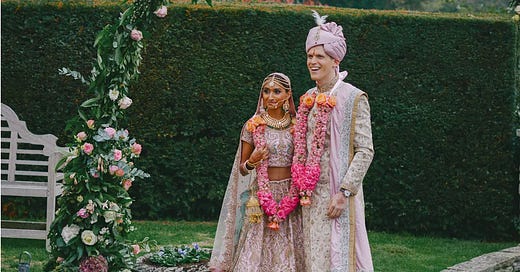Desire across borders
Eshita Kabra-Davies discusses sex and desire across cultures, interracial couples and fashion.
Eshita Kabra-Davies is the founder of By Rotation, a fashion rental service for the high fashion girlies. Her Instagram is full of glamour, West London eats and nights out, her cute pup and, occasionally, her suited and booted husband. It’s also filled with her chatting on panels and news channels, speaking at the UN, and appearing at influential fashion events.
Eshita was born in Rajasthan and grew up in Singapore. After a stint in the US, she moved to London for business school. After graduation, she worked in investment banking and management before moving into the world of fashion tech.
She identifies as a Third Culture Kid — someone who spent formative years in a place that isn’t their parents homeland — and her accent confirms it.
It honestly blows my mind that we hadn’t met before this interview — you would think our mutual love for second hand fashion and being brown founders in London would have ensured our paths crossed. I’m so glad we finally did.
When did you become aware of sex?
Popular culture made me aware that girls and boys like each other, date and kiss. I loved Mary Kate and Ashley Olsen, for example. Their books talked about them going on dates and getting kissed on the front porch at the end of an evening. I remember thinking, ‘Oh that must have something to do with how babies are created’.
I also remember watching the car scene in Titanic — that moment where they’re in the back seat and the windows get all steamy — and thinking that something I didn’t quite understand was happening.
When I was about nine, I was taught the science of sex at school in Singapore and it was all very clinical but it allowed me to piece things together.
When you were growing up in Singapore, how did society view sex?
Premarital sex in Singapore was discouraged. When I was 12, my class watched a video about sex workers who ended up with STDs and falling pregnant. The childbirth scene was horrific — the baby fell into the toilet. There was another video we watched that said if you sleep with one person and that person had previously slept with five other people, then you’ve also slept with those five people and who knows what diseases they might have. The videos were meant to scare us and it worked because we were all like ‘woah, sex is really bad for you’. Pre marital sex was shamed on a similar level to drinking, smoking and drugs. And, like those things, the more something is made taboo or hidden, the more you want it.
Watching TV, I’d always have a finger hovering over the remote control in case a sex scene came on. The channel had to be changed quickly so my parents didn’t catch me watching something inappropriate. I didn’t want them to think I was a pervert — the worst thing you could be. If you showed an interest in wanting to know more about sex, then you were a deviant who would probably bring shame to the family by having premarital sex and getting pregnant with a guy who would immediately leave you — you’d forever be an outcast in society.
Did your parents speak to you about this stuff?
No, never.
According to my parents, I had no guy friends in Singapore. Of course, that wasn’t true. I had had a few boyfriends but it was always a secret. I’d delete any text messages immediately from any guy so my parents would never see it.
It’s not made me particularly comfortable talking about sex, even with friends.
Do you chat to any of your friends about sex now?
I have a group of friends that never discuss how big a guy's dick is or how great (or not) the sex with our partners is. One of the girls in the group, for example, recently announced that she is pregnant. We are incredibly close — I was the first person she told after her parents — but we would never discuss how it happened or even whether it was planned.
The group is quite reserved and it also sees me as that: An Indian woman who is well behaved and quite formal — I don't give people nicknames, I don't take on any nicknames, I always shake hands and I never go in for a hug the first time I meet someone. They see me as someone who doesn't like to share too much about my personal life, especially about my or someone else's body.
Then, there’s my other group of friends, my girly girls, who I can talk to about sexual experiences, explicitly. Maybe because we met later on in our lives when we were already working and successful that we didn’t need to be so serious. The comfort isn’t because I'm closer with them over the other group — if anything, it’s because I’m closer with the former group that’s known me for so long that I feel more conscious.
How has your relationship with sex evolved since leaving Singapore?
Sex as a topic was purposely avoided at every stage of my early life. Yes, I lived in a big city in Singapore. We were clubbing and drinking from the age of 16 so I knew what was available to me but I lived at home. When I got to university I decided to do whatever the hell I wanted.
During freshers weeks there was definitely peer pressure to date and sleep with a lot of guys — it felt like you had to catch ‘em all like Pokémon, you know? But I never felt that pressure to go get some or to always say yes in case I never got the opportunity again. I have always felt like if a man wants access to me it is a big deal and he has to court me and work for it. I have high standards and I think very highly of myself — he would need to show me that he deserves me. Don’t mess with me unless you want to invest in me, basically. It allowed me to filter people out who were just wasting my time or would be better off as friends. I was known as a blue baller, though! If any of my guy friends’ friends tried to hit on me, they'd tell them, ‘don't even bother, she will take you for a ride for months and months’. I liked that because it meant whoever I did get with was probably pretty special. I look back now and I don’t feel like I missed out. Numbers don't really matter. It’s the quality and the emotional connections that are remembered.
When I moved to London, a friend warned me how different relationships are here: people have sex first, then they decide if they want a relationship. Whereas in Asia, people date first.
You’re married to James who is a white English man. How has that been perceived?
When I walk around with James in Singapore, people do look at us. One reason is his height but it’s also our race. Although James is conscious of the looks, they’re meant for me. There is a judgement there of South Asian women who date white men: Do you not like the men from your own culture? Do you need a white saviour? Are you trying to reach above your station? James is seen as the settler and I'm the reacher. If an Indian guy got with a white girl, though, it would be celebrated — he was able to “bag” one of the white hot girls.
He's not with me because I'm brown or ‘exotic’. Yes, he likes the fact I’m brown and have a culture he appreciates the beauty of but he’s not fetishising my race or my culture. He's not trying to prove anything. I’m not trying to prove anything. I feel like we don’t have to explain this in the UK or the US.
Is ‘desire’ different in India/Singapore vs the UK/US?
Here, in the UK and the US, being desired sexually as a woman can be empowering. Think of Lana Del Rey: She oozes desire. Women want to be like her, straight men desire her and gay people love her too — everyone wants a slice of her.
Whereas in South Asia, if you’re sexy and confident, you're seen as too loud and too attention seeking. Your purpose in life is not to be desired but to be useful to your family. Do what your family tells you to do and then have a family of your own. Being desired is a bad thing — just watch Bollywood films where the sexy woman is meant to be the baddie.
South Asian women have rarely been painted as objects of desire. We're literally not in any modern works of art — check out all of the museums in London where there are tonnes of paintings of white women in the nude, being sexy and sexually gratified. This wasn’t always the case (see the Kama Sutra and homoerotic paintings in temples) but somewhere in India’s history, this all changed and sex became taboo.
Let’s talk about desire at work.
On the trading floor, guys were buying golf clubs and I was buying heels. I dressed well for work and, sometimes, people had a problem with it. There was a senior woman, for example, who had an issue with how I dressed and accused me of dressing to attract the men. Her grey suits felt threatened by me. She said she wanted my work to do the talking, whilst she judged me for my Louboutins.
Now, in my new role as a fashion tech founder my sense of style is the reason why By Rotation is succeeding. I’m known for it and customers like it. My style is elegant but alluring. Look, I work out and I'm proud that I work out so I like to show off my assets. I don’t feel like I have to subscribe to a specific style to show that I am a boss. As the woman in my previous industry said, I let my work do the talking.
But that’s not the case in general on the female founder scene. Every woman seems to have a headshot wearing a brightly coloured blazer that screams ‘I'm serious business but I'm a girl that’s proud to wear pink.’ It’s not the grey suit of the trading floor but it still feels like it’s following some girlboss rulebook.
Do you think female founders who don’t work in fashion are held to a different standard?
I am aware it works for me because my business is fashion and clothes. I think it’s also because I’m married — I am perceived to have no ulterior motive. I understand maybe the girlboss uniform could be a protection from harassment or people presuming you’re trying to attract VCs for funding or whatever. But sexy isn’t a reflection of intelligence — the words coming out of your mouth are and the work you’re putting out into the world is.
Thank you for reading! And to Eshita, happy birthday! Thank you so much for all of your time.
You can follow Eshita’s Instagram here. If you want to rent someone else’s wardrobe, check out By Rotation here (promise this is not an ad!).










I admire the clarity and directness of your questions and the willingness of your guests to answer them.